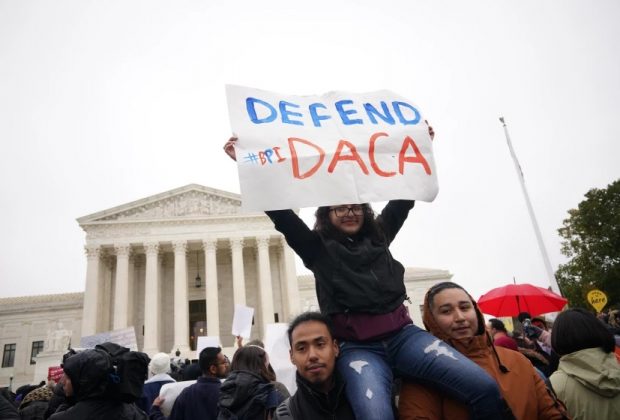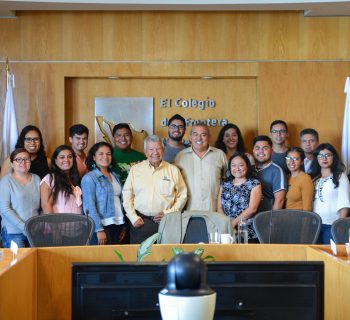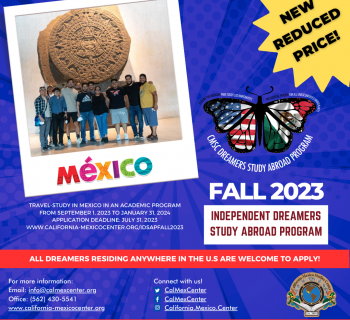|
Column by Jean Guerrero | Los Angeles Times | MAY 12, 2022 | Photo by Mandel Ngan
|
|
Columnist Jean Guerrero offers a primer on the High Court's recent and historic efforts to roll back Civil Rights gains for Latinos and several other marginalized peoples in the U.S.
Once the most trusted branch of government, the Supreme Court has been hijacked by the Republican Party for its war on equality and civil liberties. Latinos, who make up nearly 19% of the U.S. population, are seen by many conservatives as a threat. Not surprisingly, the effect of the court’s rulings will fall heavily on Latinos and other people of color.
Its plans to revoke Roe vs. Wade, for example, will disproportionately harm low-income women with limited time and resources to travel across states for abortions. The most affected will be the millions of undocumented women, mostly Latinas, who face Border Patrol checkpoints within the 100-mile border zone. Many won’t travel far for fear of deportation.
Forcing Latinas to carry unwanted pregnancies traps them in poverty, where they lack political strength to resist their exploitation. “It’s about power and it’s about control,” Chio Valerio-Gonzalez, organizing director at Latino advocacy group Mijente, told me. “If you keep people poor, you keep them working, you keep them with their heads down.”
But the attack on Latinas is just the beginning of the GOP dream to create an anti-Latino dystopia. As Nancy Meza, national organizing director at the refugee and immigrant legal services group RAICES, told me: “We’re seeing this attack on reproductive rights as an attack on civil liberties overall.”
The reasoning in Justice Samuel A. Alito Jr.’s leaked draft of an opinion overturning Roe vs. Wade poses a threat to Obergefell vs. Hodges, which legalized same-sex marriage. Of all millennials, Latinos are the least likely to identify as heterosexual; they have the most to lose... READ MORE
|
|
|
By Zeke Miller, Andrea Martinez & Aamer Madhani | Los Angeles Times
MAY 15, 2022 | Photo by Ramon Espinosa for AP
|
|
WASHINGTON — The Biden administration announced Monday that it will expand flights to Cuba, take steps to loosen restrictions on U.S. travelers to the island, and lift Trump-era restrictions on remittances that immigrants can send to people on the island.
The State Department said in a statement that it will remove the current $1,000-per-quarter limit on family remittances and will allow nonfamily remittance, which will support independent Cuban entrepreneurs. The U.S. will also allow scheduled and charter flights to locations beyond Havana, according to the State Department.
The administration said it will also move to reinstate the Cuban Family Reunification Parole Program, which has a backlog of more than 20,000 applications, and increase consular services and visa processing.
“With these actions, we aim to support Cubans’ aspirations for freedom and for greater economic opportunities so that they can lead successful lives at home,” State Department spokesman Ned Price said. “We continue to call on the Cuban government to immediately release political prisoners, to respect the Cuban people’s fundamental freedoms and to allow the Cuban people to determine their own futures.”
The policy changes come after a review that began soon after a series of widespread protests on the island last July.
|
|
|
By Karen DeYoung | Washington Post | MAY 16, 2022 | Photo by Alexandre Meneghini
|
|
A general amnesty—or even the threat of one—could do right by the Dreamers and maybe force a legislative compromise.
The Biden administration is lifting several Trump-era restrictions on Cuba, including on some aspects of travel to the island, caps on family remittances and the issuance of immigration visas.
A State Department statement described the measures as designed “to further support the Cuban people, providing them additional tools to pursue a life free from Cuban government oppression and to seek greater economic opportunities.”
The decision comes after a lengthy internal review, whose implementation was delayed after a Cuban government crackdown on widespread street protests on the island last summer.
The administration has been under pressure to ease the numbers of migrants crossing the southern U.S. border, where tens of thousands of Cubans have become the second-largest group of those seeking unauthorized entry through Mexico. Last month, the administration and Cuba held direct migration talks for the first time in four years.
Under decades-old bilateral accords, the United States had agreed to issue at least 20,000 immigrant visas annually to Cubans in exchange for Cuba’s agreement to accept deportation flights of those who arrived illegally or were deemed otherwise inadmissible.
Those agreements were suspended in 2018 as part of the Trump administration’s reversal of President Barack Obama’s opening to Cubathat had led to a restoration of diplomatic relations in 2015. Visas of all types were further limited by sanctions, and the U.S. Embassy and consulate were reduced to skeleton staffs in 2019.
Under the new measures, the administration will increase capacity at the consulate and reinstate a family reunification parole program... READ MORE
|
|
|
By Fabiola Sanchez & Joshua Goodman | Los Angeles Times
MAY 10, 2022 | Photo by Yamil Lage
|
|
MEXICO CITY — Mexico’s president said Tuesday that he would not attend next month’s Summit of the Americas in Los Angeles if the Biden administration excluded Cuba, Venezuela and Nicaragua — adding his voice to increasing warnings of a boycott by some leaders across the region.
President Andrés Manuel López Obrador has been saying in recent weeks that the U.S. government should not exclude anyone from the summit, but he had not previously threatened to stay home.
“If they exclude, if not all are invited, a representative of the Mexican government is going to go, but I would not,” López Obrador said during his daily news conference, fresh off a visit to Cuba. He said his foreign affairs secretary, Marcelo Ebrard, would go.
The Mexican president’s absence would be a blow to the summit expected to deal heavily with the issue of migration at the U.S.-Mexico border. The Biden administration has worked for months to build regional consensus. Cabinet members have been visiting the region urging allies to shore up immigration controls and expand their asylum programs.
“Our goal is ... to sign a regional declaration on migration and protection in June in Los Angeles when the United States hosts the Summit of the Americas,” President Biden said in March, when he hosted Colombia President Iván Duque at the White House... READ MORE
|
|
|
By Brian Winter | Americas' Quarterly | MAY 12, 2022 | Photo by Yamil Lage
|
|
Latin American governments are keen to show Washington it’s a new era. But this is also a tale of democracies in decline, writes AQ’s editor-in-chief.
The whole controversy has a distinctly post-imperial feel to it: One by one, several governments in Latin America and the Caribbean are drawing a line in the sand, saying their presidents may not attend the Summit of the Americas next month unless the host, Washington, agrees to invite everybody—including the region’s dictatorships in Cuba, Nicaragua and Venezuela. But what feels to many like Latin American solidarity, or a golden opportunity to stick it in Uncle Sam’s eye, also tells a less flattering story about the region’s current political reality—namely, a wavering commitment to democracy.
To briefly recap how we got here: Biden administration officials have indicated the United States will only invite democratically elected leaders to the summit taking place in Los Angeles in early June. This feels to many in Latin America like a big step backwards, after Cuba was finally invited to a previous Summit of the Americas, hosted in Panama in 2015, following years of similar debates. Barack Obama famously shook Raúl Castro’s hand at that meeting; the universe did not implode. Mexico’s President Andrés Manuel López Obrador said this week he will not attend unless all countries are invited; several Caribbean leaders, and the presidents of Bolivia and Honduras have made similar statements.
So why is this happening again? One reason, of course, has to do with U.S. politics: The bloc of Latin Americans and their descendants in South Florida and elsewhere who saw their lives destroyed by the dictators in question, and would lash out at the ballot box if they were invited to an event on U.S. soil. It’s also true, though less commented, that since the heady days of 2015 when an opening felt possible, Cuba has repeatedly slapped away chances to liberalize, instead cracking down even further on its citizens. In March, it sentenced more than 100 people to jail terms of up to 30 years for participating in mostly peaceful protests over COVID-19 and food shortages in 2021. No one can seriously claim that momentum in Venezuela or Nicaragua is moving in the right direction either, or would be helped by inviting them... READ MORE
|
|
|
By the Los Angeles Times Editorial Board | MAY 12, 2022 | Photo by Carolyn Cole
|
|
The upcoming retirements of several U.S. House members from California have made this a year of generational change for the state’s representation in Washington. That’s especially true in the new 42nd Congressional District, which combines areas in southeastern Los Angeles County and Long Beach represented for many years by Democratic Reps. Alan Lowenthal and Lucille Roybal-Allard. Their retirements have created a lively contest among eight candidates in the June 7 primary, two of whom have especially impressive records.
Assembly member Cristina Garcia, a Democrat from Bell Gardens, won office a decade ago by fighting corruption and machine politics. She’s taken on difficult fights in the Legislature, trying to improve the environment in her industry-heavy district and address the financial burden of menstrual products for low-income girls and women — a taboo subject when she first started talking about it in the halls of power. As leader of the women’s caucus, she’s worked to elect more women to the male-dominated Legislature.
Robert Garcia, the Democratic mayor of Long Beach, also has proven to be a trailblazer during his eight years in office. At age 36, he became the city’s youngest and first openly gay mayor. He’s worked with the Biden administration to shelter children who cross the U.S.-Mexico border without their parents at the Long Beach Convention Center and helped establish a “guaranteed income” pilot program giving $500 a month to single mothers who earn less than $20,000 a year. His leadership during the COVID-19 pandemic is noteworthy. After losing his mother and step-father to the disease, he spearheaded an aggressive vaccination campaign that was lauded as a model for the state.
|
|
|
Tap the image below to learn about the origin story and history of our namesake, Los Magonistas!
|

|
|
|
Interview with Amy Goodman | DemocracyNow.org | MAY 10, 2022
|
|
|
CENTRO CHA COMMUNITY UPDATE
|
|
|
USCIS Filing Fee Assistance
|
|
|
This year, Centro CHA was awarded funding by the California Department of Social Services (CDSS) to support the payment of the United States Citizenship and Immigration Services (USCIS) application filing fee for Naturalization applicants.
This will continue until funding subsides, so don't wait & apply today!
|
|
|
|
Please consider sponsoring our program today!!!
To be a sponsor contact Professor Armando Vazquez-Ramos at: armando@calmexcenter.org or 562-972-0986
|
|
|
|
|



















